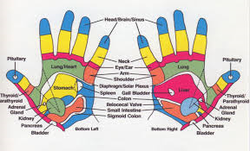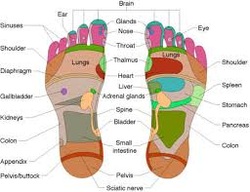About Reflexology
ROOTS OF REFLEXOLOGY - Reflexology, like many other holistic healing methods, can be traced back to ancient cultures in countries such as China, Japan and India. In Egypt, evidence has been found to offer proof of footwork performed by healers of that era. For example, pictographs showing this footwork have been found in temples and entrances to tombs. Modern Reflexology in the United States began as zone therapy practiced by Dr. William H. Fitzgerald about a century ago. Dr. Fitzgerald found that by applying pressure to one area of the body relieved pain in another area. Zone therapy was further developed by Dr. Shelby Riley, who discovered the link to horizontal zones which included the hands and feet. Soon after this discovery, Eunice Ingham, a physiotherapist, introduced modern Reflexology to the United States in the 1930's. Eunice Ingham refined ancient foot maps into today's modern foot charts. These modern foot charts are anatomically structured. If a drawing of the human body were sized to fit the feet and placed on the bottom (plantar area) of the feet, the organs would very closely match the corresponding reflex areas
|
REFLEXOLOGY DEFINED - The 7,200 nerve endings in each hand and each foot carry messages within the body to instruct it to function normally, or in a state of homeostasis. These nerve endings are the main components to the workings of Reflexology. When the exercise of pressure is applied to the nerve endings in the foot, instructions to the body improve. Reflexology helps to promote improved instruction between the nerve endings and the body. When the nerve improves, the instruction improves, and then the body improves. In essense, the Reflexologist is the facilitator of homeostasis in the body.
|
"Reflexology is a complementary, biological, blended, integrative health science through which an exercise pressure is applied to reflex areas, formed by 7,200 nerve endings in each hand and each foot, encouraging improved instruction to each and every single organ, gland and part of the body, thus persuading the body to biologically correct, strengthen and reinforce itself."
Professor Lorraina Telepo (International Academy of Advanced Reflexology) |


Benefits of Reflexology
The human body was created for survival. In good health, the body systems work together to create a delicate balance of wellness. Although the body can become ill, or diseased for many reasons, current theory suggests that stress is the major factor in major illness. Biologicaly speaking, a certain amount of stress is necessary for the body to survive.
However, continually repeated stress is unhealthy because it can produce pathological changes in the body. Excess stress to the body comes in a variety of forms such as anxiety, worry, emotional problems, pollution (including air, chemical, and electromagnetic), pesticides, and processed foods. Pathological changes can surface in your body as aches, pains, or improperly working body parts. The reflex areas, when stimulated, carry improved instruction to the improperly working area to bring it back into balance, or homeostasis.
Reflexology benefits your Body. When the reflex areas are stimulated, your entire body relaxes, which has a tremendous impact on how your body feels. Through Reflexology, you may gain an increased awareness of various body sensations. For example, you may notice how “tight” your body feels in a stressful situation versus how “loose” it feels at rest. It is important to note these sensations, as it may help motivate you to maintain your relaxed state.
Reflexology benefits your Mind. When your body is at rest, your mind can relax. A relaxed mind has more thoughts of appreciation and gratitude than a stressed mind which houses thoughts of worry and fear. Through Reflexology, you may gain an increased awareness of the multitude of thoughts that enter your mind. For example, you may become more aware of the number of positive thoughts versus negative thoughts you have in certain situations. It is important to note these thoughts, as it may help motivate you to retain the positive and discard the negative.
Reflexology benefits the Sole. Your feet, or course, feel rejuvenated at the end of a session. You’ll likely notice how light and flexible your feet feel after your treatment. Through Reflexology, you may also notice a benefit for your soul, or spirit. For example, when your body is not tight with pain and your mind is not clouded with negative thoughts, you may become more aware of your intuitive side as you become more present in your surroundings.
_________________________________________________
Reflexology can be used as a complementary therapy for many medical conditions. It can help reduce symptoms such as headaches, body aches, anxiety and digestive problems that arise in many medical conditions.
Reflexology can be used as a safe, non-invasive relaxation therapy. Reflexology encourages improved circulation and restores the body's natural balance. A body in balance is a relaxed body, therefore a major benefit of Reflexology is total body relaxation.
Through the relaxation of Reflexology sessions, the body will be able to restore itself to balance. When a body is in balance, it allows for healing, on physical, mental and spiritual levels.
However, continually repeated stress is unhealthy because it can produce pathological changes in the body. Excess stress to the body comes in a variety of forms such as anxiety, worry, emotional problems, pollution (including air, chemical, and electromagnetic), pesticides, and processed foods. Pathological changes can surface in your body as aches, pains, or improperly working body parts. The reflex areas, when stimulated, carry improved instruction to the improperly working area to bring it back into balance, or homeostasis.
Reflexology benefits your Body. When the reflex areas are stimulated, your entire body relaxes, which has a tremendous impact on how your body feels. Through Reflexology, you may gain an increased awareness of various body sensations. For example, you may notice how “tight” your body feels in a stressful situation versus how “loose” it feels at rest. It is important to note these sensations, as it may help motivate you to maintain your relaxed state.
Reflexology benefits your Mind. When your body is at rest, your mind can relax. A relaxed mind has more thoughts of appreciation and gratitude than a stressed mind which houses thoughts of worry and fear. Through Reflexology, you may gain an increased awareness of the multitude of thoughts that enter your mind. For example, you may become more aware of the number of positive thoughts versus negative thoughts you have in certain situations. It is important to note these thoughts, as it may help motivate you to retain the positive and discard the negative.
Reflexology benefits the Sole. Your feet, or course, feel rejuvenated at the end of a session. You’ll likely notice how light and flexible your feet feel after your treatment. Through Reflexology, you may also notice a benefit for your soul, or spirit. For example, when your body is not tight with pain and your mind is not clouded with negative thoughts, you may become more aware of your intuitive side as you become more present in your surroundings.
_________________________________________________
Reflexology can be used as a complementary therapy for many medical conditions. It can help reduce symptoms such as headaches, body aches, anxiety and digestive problems that arise in many medical conditions.
Reflexology can be used as a safe, non-invasive relaxation therapy. Reflexology encourages improved circulation and restores the body's natural balance. A body in balance is a relaxed body, therefore a major benefit of Reflexology is total body relaxation.
Through the relaxation of Reflexology sessions, the body will be able to restore itself to balance. When a body is in balance, it allows for healing, on physical, mental and spiritual levels.
